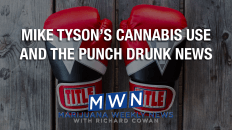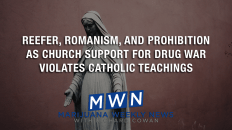Adapted From MjNews 2008
When the late Hanah Arendt used the striking phrase “the banality of evil” in the title of her book, Eichmann in Jerusalem: A Report on the Banality of Evil, some people seemed to misunderstand and think she meant the word “banal” to mean something close “trivial.” In fact, the dictionary says that it means “lacking originality.” “Trite” is another synonym.
Arendt was probably surprised by the evocative power of that phrase. In subsequent writings she took some pains to explain what she really meant. To her, thoughtlessness, or, more precisely, the inability to think critically, lay at the heart of the problem of evil, and hence its banality.
SEE: DOES A FOOTBALL STAR HAVE TO GET KILLED FOR AMERICANS TO SEE HOW DANGEROUS THE DRUG WAR REALLY IS?
She wrote, “Inability to think is not stupidity; it can be found in highly intelligent people…”
Like the editors of The Washington Post?
She also believed that “The greatest evildoers are those who don’t remember because they never given the matter a thought; nothing can keep them back because without remembrance they are without roots…”
This is why I keep talking about the importance of context, and why Orwell wrote about the “memory hole.”
I like to say that cannabis prohibition causes long-term memory loss.
Eichmann was not directly involved in killing, but was simply a Gestapo bureaucrat for whom sending humans to death camps was just a logistical problem. What he did was legal under Nazi law, and he was just doing his job.
In fact, evil on a large scale usually involves some sort of logistical problems, which means that the operation may depend on many people who will not be directly involved in the killing. These people do not fly highjacked airplanes into office buildings, nor do they handcuff cripples in their beds while cutting down their gardens.
“In September 2002, federal agents raided a Santa Cruz, California hospice where many of the terminally ill patients smoke marijuana cigarettes to alleviate their pain. Agents pointed their guns at the head of Suzanne Pfeil, an elderly post‐polio patient, and demanded that she get up from her bed. She couldn’t. She’s crippled. They settled on handcuffing her to the bed for over an hour, while they raided the hospice’s medicine cabinets and files for evidence of medicinal marijuana use. DEA Administrator Asa Hutchinson insisted the agents were only doing their job: enforcing federal controlled substance laws.”
From Bill Wilson and the Drug War By Radley Balko
They do not personally carry bombs onto buses, and they do not personally force cancer and AIDS patients to vomit their guts out.
They don’t personally kick down doors and shoot nurses in their sleep.
See LOUISVILLE SETTLES WITH BREONNA TAYLOR’S FAMILY ENDING NO-KNOCK WARRANTS BUT ONLY IN LOUISVILLE
Of course, the support mechanism for these actions will extend well beyond the logistical. Even dictatorships and closed terrorist organizations have propaganda organizations to “justify” their actions and to help them get political and financial support.
That aspect of the support system is even more important in democracies in which the actions need more “justification” than in closed societies. In this context, there is another dimension to the evil in democracies that may not exist in dictatorships.
This evil was foreseen by the Commandment against giving False Witness, because it involves making the whole of society complicit in the evil. Lying to the people, depriving them of meaning and context, banalizing important questions, these are the essential support mechanisms of evil in a democratic society. That is the specialty of The Washington Post, and it was manifested at its most blatant in an editorial published 18 years ago. (below)
During the last few weeks there have been a number of important developments in the controversy regarding cannabis. As expected, the Ninth Circuit of the US Court of Appeals upheld the injunction against the federal government that prohibits threatening doctors with a loss of their ability to prescribe pain relievers if they “recommend” cannabis to patients as permitted by a number of state laws.
This was an important First Amendment victory that would presumably be of interest to the flagship publication of a media empire, but The Post neither informed its readers in a news story nor did they find it worthy of mention in their editorial.
Similarly, NORML published the latest FBI arrest data, showing that marijuana arrests continue at record levels, and more people than ever favor outright legalization.
The Post did not find any of that worth reporting, but they never have. On the other hand, they have always been willing to make their pages available to various propagandists for cannabis prohibition, most recently, the current Drug Czar.
The point here is that there is an essential nexus between being mindless and being soulless. If one does not – cannot – think, then there is no reason to care about the consequences of anything, so long as it does not impinge on the power of the Party.
This is why Orwell said that destroying the ability to think was an essential part of destroying freedom. He made the point that depriving words of their meaning would make censorship unnecessary.
Recently, many newspapers have criticized the attacks on medical cannabis patients, and the Post to its credit did report on the events in Santa Cruz.
Below is the Post editorial which I think represents the absolute worst in the media support for the drug war. The premise seems to be that the Bush administration was going soft on the drug war, which only an editor of The Post would believe. However, the real message here is the Olympian detachment of the editocracy, which need not concern itself with any moral questions, much less the public. The Washington Post was institutionalized arrogance.
The Drug War Going Nowhere Fast
(MarijuanaNews note: The premise here seems to be that the Bush administration is going soft on the drug war, which only an editor of The Post would believe. However, the real message here is the Olympian detachment of the editocracy, which need not concern itself with any moral questions, much less the public. The Washington Post is institutionalized arrogance.)
From The Washington Post, November 1, 2002:
Washington’s crusade against terrorism is pushing the drug war to the sidelines and causing a sharp reduction in resources and financial assistance available to many Latin American countries for whom anti-drug initiatives were the primary source of U.S. aid.
Some members of Congress and former anti-drug officials fear that the problem is becoming worse as the administration’s interest wanes– even as President Bush has declared governmental corruption in Latin America a major enemy.
There have been several critical changes in the White House’s war on drugs. At the end of September, Bush signed legislation that effectively eased the criteria by which the United States identifies nations as friends or foes in the international drug war. For more than a decade Washington threatened sanctions against those it placed on the wrong side. The change is appreciated in Latin America.
The State Department’s budget for international anti-drug efforts, other than Plan Colombia, has been reduced by 45 percent from its 2001 level. And even though Plan Colombia’s proposed funding is going up by 7 percent, its focus has been diffused to deal with terrorism as well as drugs-amounting to another budget cut.
Much the same is true at the Pentagon, where senior officials have gladly refashioned counter drug activities they were not thrilled about in the first place into the service of the anti-terrorism war. Not surprisingly, the job of assistant secretary overseeing those programs has been vacant since Bush was sworn in 21 months ago.
For decades, drugs have been a growing threat to Latin America.
After the Cold War ended, anti-drug programs became a meal ticket for the region’s governments in the form of U.S. assistance to Latin America. Millions of dollars poured into the region to control illicit drug crops, intercept drug shipments or arrest drug traffickers before they could derail struggling democracies.
Now, with such efforts slowed and the demand for illicit drugs increasing in the United States and throughout the region, some here are worried that drug corruption will be an even greater threat to smaller countries in the region trying to make both democracy and their economies work. A case in point is Guatemala, where officials just disbanded the country’s anti-drug agency because it was so plagued by corruption.
Guatemala’s Attorney General Carlos de Leon, in Washington this week pitching for financial support to keep the anti-drug offensive going, acknowledged that corruption is a problem in that Central American nation.
But, he said, if Washington and Latin America they focus on combating terrorism and assume that other evils automatically will be reduced in the process, they “are not taking the right approach.” Had Washington been more engaged in anti-drug efforts in Guatemala, he reasoned, corruption in the counter-narcotics agency may have been less.
There is a growing feeling among some in Congress that U.S. drug policy is adrift, and regrettably, they say, there have been no interagency discussions to evaluate changes in old anti-drug programs or to come up with new ones.
John P. Walters is the new drug czar in town.
SEE: PROFILES IN PROHIBITION: DRUG CZAR JOHN WALTERS- THE MADDEST OF REEFER MADNESS
His predecessor, Barry McCaffrey, was an armored division field commander during the Persian Gulf War who later became familiar with and to Latin America as the general in charge of the U.S. Southern Command. He was chosen by President Clinton in part to appease conservatives.
See PROFILES IN PROHIBITION: GENERAL BARRY MCCAFFREY’S WAR ON MARIJUANA USERS
Walters, with no such war medals or regional experience, has conservative appeal of a different type. He was an aide to the first U.S. drug czar, William J. Bennett, when Bush’s father was president. Bennett, a leading conservative thinker, was also secretary of education and approached the anti-drug fight more as a moral issue.
Walters is a cabinet-level official (the last to be confirmed, by the way) who is in the best position to put the fight back in the spotlight. Since taking office less than a year ago, he has taken particular pride in changing the government’s message to young people and replaced an old, ineffective ad campaign against drugs with a powerful one that connects drug use to murder and terrorism abroad.
That connection is welcome, but not enough. It is true that there are links between terrorism and illegal drugs, but each is an issue on its own. If the drug problem seems less urgent in Washington now, it is only because it has been pushed aside, into the shadows. The problem is that it can grow there, and may be even more menacing once it is-inevitably-back in the light.
To this day the Post has not repudiated its role as the Drug Czars’ megaphone.
One last quote from Hannah Arendt: “What makes it so plausible to assume that hypocrisy is the vice of vices is that integrity can indeed exist under the cover of all other vices except this one. Only crime and the criminal, it is true, confront us with the perplexity of radical evil; but only the hypocrite is really rotten to the core.”)
- Richard Cowan is a former NORML National Director and author of The Anxiolytic And Anti-Depressant Properties Of CBD.




